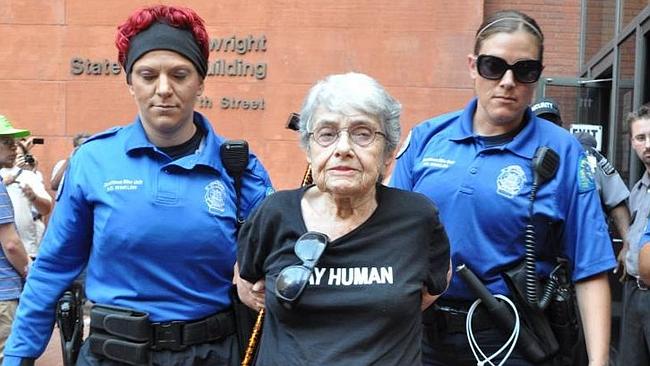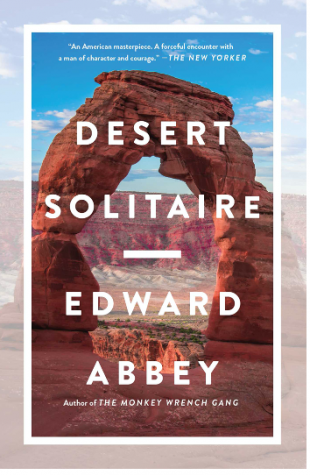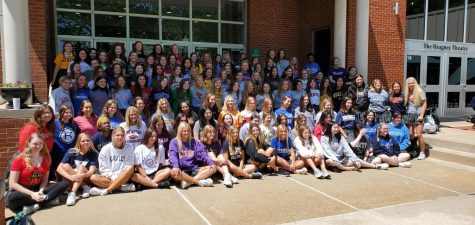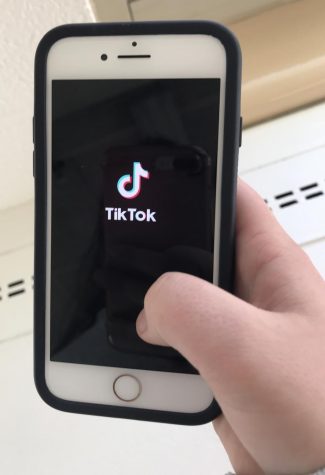From Ferguson to Palestine
90-Year-Old Holocaust Survivor and Activist Hedy Epstein Speaks
On Monday, September 28th, Hedy Epstein came to speak to a number of Ethics classes about her experience as a Holocaust survivor. Epstein was born in Germany and lived there during nine years of the Nazi regime. In 1939, she went to England as part of the Kindertransport to escape the increasing danger that the Nazi regime posed to Jews. After the war, she came to the United States and soon began her activism for issues such as fair housing, the Palestinian cause, racial equality and, most recently, Ferguson.
Q: What made you want to go into activism?
A: When I came to this country in 1948, I started working two weeks after I arrived in New York City, and the woman that showed me what I’m to do was an African American lady. On the first day that I was there, shortly before it was lunchtime, she said to me at noon, “Did you bring your lunch?” and I said “No.” She said “well…,” and she named all these restaurants that were in the neighborhood. I said, “Well, can we go together?”, and she said, “no.” I didn’t really think anything of it because maybe she made arrangements to go to lunch with somebody else. I said, “Well, maybe tomorrow,” and she said “no.” So I waited a couple of days, and I asked her again, “Can we go to lunch together?” She said “no,” and I said, “ You know, is there something about me that is troubling you, and if so, please tell me.” She said “Well, you know why we can’t go to lunch together.” I said “No, I don’t know. Please tell me,” and so she said, “Well, you know, where white people go to eat, African Americans can’t go, and white people don’t want to go where I can go.” I said “Wait a minute, I read somewhere that Lincoln freed the slaves (that was almost a hundred years ago at that time), and you can’t go to eat where I go? Isn’t somebody doing something about this?” She said, “Well, yes. The Urban League and the NAACP are working on it,” and I said “How do I get into this?” That was the beginning of my working in civil rights. I was ignorant but astonished that this woman couldn’t go to eat lunch with me.
Q: We were also wondering about your views on the current conflict between Gaza and Israel.
A: Well, I have been to the Israeli occupied West Bank five times since 2003. I have made five attempts to go to Gaza, but I have never made it. I am totally opposed to Israel’s policies and practices and the military’s policies and practices. Especially as a Jew, as a survivor, we know what persecution is like; how can you then persecute another people? How can you occupy another people? It’s beyond my comprehension, and so that’s an issue that I have been very much involved in.
Q: Within the Jewish community, do you find that people are supportive of your views, or do they support the Israeli state?
A: To a lot of them, I mean especially here in the St. Louis community, I am persona non grata [an unwelcome person]. I’m anti-Semitic, I’m a self-hating Jew. I don’t hate myself, and I sometimes, maybe get angry with myself for something I did or didn’t do, but I don’t hate myself. I’m not anti-Semitic. I don’t think I’m a traitor. A little more than a week ago I returned from California. The UCLA Law School had a panel, the title of which was “From Gaza to Ferguson,” and the Anti-Defamation League which looks into where there is discrimination, where there is anti-Semitism, was very upset with the title of this panel. They thought that it was anti-Semitic and that I am anti-Semitic, and I need to be removed from the panel. The title wasn’t changed, and I understand that the Law school learned that some of the Jewish students at the law school were trained and tutored by the Anti-Defamation League in what to say and what to ask at this panel discussion. After the panel spoke, during the question and answer period, there wasn’t a single question from any of them. I’m not sure that I know why. I’m frequently accused that I am not a Holocaust survivor because I wasn’t in the camps. They think they can discredit me this way, and anything I say or do is also discredited. So, before I made my formal remarks on that panel, I said “I understand that there’s some Jewish people in the audience, and one of the comments I usually get when there are Jewish people in the audience is that I’m not a Holocaust survivor. And I’m not going to argue that with you. The Holocaust Museum in Washington D.C. has said that anyone who ever lived under the Nazi regime is a Holocaust survivor, and I lived under the Nazi regime between 1933 and 1939, so if you disagree with that, don’t argue with me about it. Take it up with the Holocaust museum.” And I happen to agree with their [statement].
Q: I heard that you were recently arrested. Where was that?
A: We gathered at Kiener Plaza, and there were about 200 of us. Then we marched about a block to the Wainwright building where Governor Nixon has an office, and we wanted to talk to him and ask him to deescalate the violence in Ferguson. When we arrived there, police were blocking the entrance to the building and wouldn’t let any of us in, although there were some people that left the building. There were some people who wanted to enter that were not with us and maybe worked there and had business there. They were allowed to enter, but the police and security people would not let us enter. After we were there in that plaza for maybe 20 minutes or a half hour, a police lieutenant came and announced “The governor is not in his office, and his staff is not in his office.” On a Monday afternoon around three? I mean it’s possible the governor might not be there, and it turned out he really wasn’t there. We found out later on that he was playing golf. But his staff wasn’t there on a Monday afternoon at 3 o’clock? This is a public building. It’s a state building, paid by by the taxes of the citizens of Missouri. I’ve been in that building before on some unrelated business, and it should be open to the public. This police lieutenant asked us to disperse, and I could just sense something’s going to happen. All the sudden, you see the police straighten up. It seemed to me, like two seconds later and maybe it was a lot longer, but it seemed like almost instantly, the policeman grabbed my arm and put it behind my back and took my other arm and put it behind my back, and I was handcuffed. There were nine of us, and I know two of them. We were taken to a nearby paddy wagon and taken to the Jefferson Avenue police substation. They did not take photographs of us; they didn’t take fingerprints. They just took our vital information: birthday, address, etc., and when they were done with the nine of us, they said, “Follow us. We are going to take you to the front of the building. You’re ready to go, but we have a citation. You’re accused of failure to disperse, and we have a court date on October 21st at 3 o’clock in the afternoon.” I’m hoping that they’ll dismiss the case beforehand because it’s a waste of time, and it’s a waste of money. St. Louis needs money. They are always saying “We’re short of funds,” and they’re going to waste it on a trial of nine people? If they find us guilty, we will probably get community service. So what’s the point of that?
Q: So you are obviously still very active in this work, and I was wondering how you keep yourself motivated with all these causes? What motivates you to continue?
A: Well, I know what it’s like to be oppressed, and I know what it’s like to be discriminated against. I can’t just stand idly by when I know something is happening. Now, I know lots of things happen in the world, and I can’t do everything. As I mentioned before, I identify something that is an issue that I really want to work on. Ferguson is in my own backyard, and instead of trying to go to Gaza, you can go to Ferguson. It’s a lot cheaper.
Q: What advice do you have for us – young people who are interested in the world and making it a better place? What would you suggest?
A: Well, identify something that you really want to work on and find out as much about it as you can. You know the Internet is a wonderful resource that I didn’t have when I was your age. For whatever you’re interested in, I’m sure there’s some group that is probably working on that. Become involved with it. Not everybody is going to put herself in a situation where she might get arrested. In fact, I hadn’t planned [on being arrested]. I hadn’t even thought about getting arrested that day when going downtown to talk to the governor of Missouri. That wasn’t my goal. You know somebody else maybe is a good graphic artist and can make flyers and signs, and that is also a good work. Somebody else is a good writer. They can issue a press release. So there are many different things that people can do working on a specific issue. And if you don’t become involved, and you know things are happening, but you turn your face and say “It’s none of my business. I’m not going to get involved,” you become almost as guilty if not as guilty as the perpetrator, and how does that feel to be guilty of not having done something?






